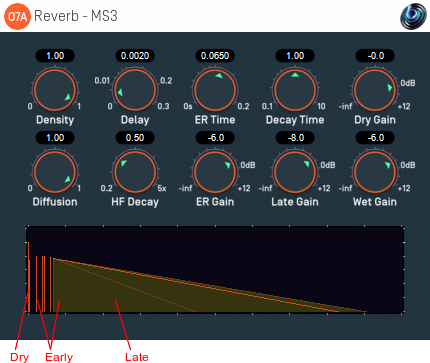O7A Reverb - MS3

Host Support
| Host Type | Support |
|---|---|
| AAX | Yes |
| VST2 | Yes |
Audio
| Channels | Content | |
|---|---|---|
| Input | 64 | O7A |
| Output | 64 | O7A |
Controls
Description
This plugin adds synthetic reverberation to an O7A stream. It uses the same high quality algorithm as the MS5 reverb, but with simplified controls.
The output of the plugin includes five simulated early reflections followed by a late reflection model which provides a decaying texture of simpler reflections.
A simple visualisation of the reverb is shown, with time along the horizontal axis and decibels along the vertical. The dry (unprocessed) signal, early reflections and late reflections are shown simplistically to help set controls correctly. Once filters, diffusion, masking and so on are taken into account the resulting impulse response typically has a lower level than shown here.
A range of presets are available for this plugin.
The plugin is available in the O7A Reverb plugin library.
Controls
Controls: Dry Gain and Wet Gain
These control how much unmodified "dry" input and modified "wet" material is included in the output. The "wet" gain applies to all reflections, both early and late.
Control: Delay
This controls the initial delay time before the reverb starts, i.e. the period of time (in seconds) between the dry output and the first early reflection.
When choosing delay times, it is sometimes useful to consider the time it takes for sound to travel a distance. The speed of sound is typically around 340m/s, so it takes about 0.003 seconds (3ms) for sound to travel one metre.
Control: ER Time
This controls the period of time (in seconds) over which the early reflections are spread.
Control: ER Gain
This controls the output level of all of the early reflections.
Control: Decay Time
This controls the overall speed of decay of the late reflection model. It is measured as the time it takes for the late reverberation to decay in level by 60 decibels. It is modified at high frequencies by the HF Decay trim control.
Control: Late Gain
This sets the output level of the late reflection model.
Control: HF Decay
This modifies the decay time of the late reflection model at high frequencies. Values below one can be used to make the late reflections sound more distant or muffled, which is generally a good idea.
Control: Density
This controls the density of the late reflections. Higher density values produce a larger number of reflections per second. Lower values can make the room sound more "ringy".
Control: Diffusion
This controls the diffuseness of the late reflections. Higher diffusion values introduce allpass filters which result in reflections with softer transients. Lower values can increase reverb "flutter".
Presets
Presets are available for this plugin:
- Tiny
- Small
- Large
- Huge
- Scatter
- Soft
